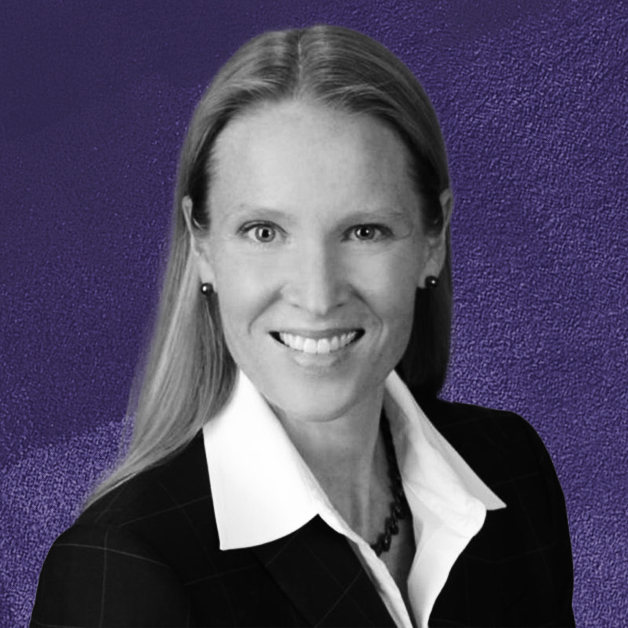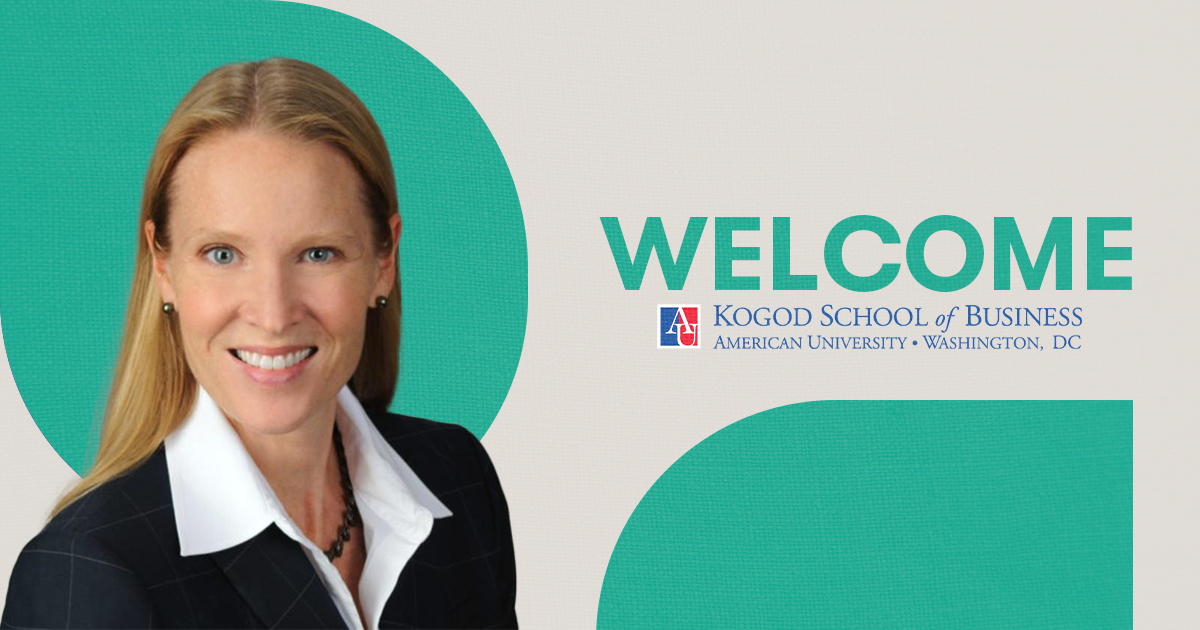
Darby Joyce
Content Marketing Coordinator
New Kogod School of Business professor Julie Anderson has always wanted to teach at a university. Though her career has given her valuable experience in management and sustainable finance, the notion of returning to higher education remained in her mind, and she’s thrilled to make that notion a reality here at Kogod.
“I really think I’m a product of the US education system, and I’ve always wanted to be a professor,” she said. “Since my undergraduate days, I always assumed that I would have a career and learn a lot, but that I would eventually return to higher education.”
Anderson joins Kogod as a professor of management and as the associate director of the school’s MS in Sustainability Management (MSSM) program. With professional experience in asset management, emerging markets, economics, and business development, she brings a wealth of knowledge from across disciplines to this new role. Most recently, she served as director of sustainable exchange-traded funds at investment company BlackRock, where she led strategy and furthered her commitment to sustainable finance by supporting clients who wanted to invest more sustainably. Her wide range of experience—combined with her passion for teaching and learning—made Kogod a natural fit for her as she took the next step in her career.
What I like about Kogod’s approach to learning is that it’s very experiential and dialogue-based. It’s not just a lecture; students are expected to actively participate and debate the topics at hand and to challenge the knowledge that exists currently.”

Julie Anderson
Professor of Management, Kogod School of Business
This semester, Anderson teaches “Sustainable Investing and Managing for Climate Change,” a course designed to help students understand the needs and challenges of sustainability in business management. As companies and organizations deal with the changing realities and impacts of climate change, it’s becoming even more critical for business students to enter the workforce with an understanding of sustainability efforts. To Anderson, the course reflects her focus on ensuring that her students have a traditional business background and the skills required to adapt and solve problems as they arise.
“I like to say that the business foundation is necessary but not sufficient,” she said. “You need a foundation of finance and marketing, but you also need critical thinking, problem-solving, and creativity. That’s what will really help them catapult their careers over time.”
Tackling new problems creatively has been a hallmark of Anderson’s research. Her interest in corporate ESG behavior has led her to investigate issues ranging from greenwashing to supply and demand to what determines the quality of a company’s environmental, social, and governance (ESG) initiatives. As somebody who strives to continue learning throughout her career, Anderson was particularly drawn to how ESG engages traditional business from an entirely new angle. Where finance as a field has been conducted in a certain way for decades, the growing interest in sustainability from consumers and investors alike has forced the discipline to rethink how things are done.
“What brought me to ESG research was the disruptive nature of it,” Anderson recalled. “Finance and asset management has been steady for a long time; we look at various financial variables and determine whether we should buy or sell an asset. Now, we’re disrupting this entirely and saying that we should also consider some non-financial variables. I thought it was fascinating and that it would change things materially.”
Anderson has been exploring ESG topics through her research since 2016. The field was—and still is—growing rapidly, and companies across industries needed experts focusing on how business needs interact with sustainability and equity. To this day, she’s astounded by the speed with which ESG caught on and the level of commitment that managers were willing to make to improve both business practices and the world around them.
What I witnessed in a short period of time was that corporations, asset creators, owners, and managers have all been willing to essentially change how they do business to ensure that the world is more sustainable for future generations."

Julie Anderson
Professor of Management, Kogod School of Business
To keep pace with the changing ESG needs in business, however, Anderson knows that she needs to prepare Kogod students for the demands of their future careers. She’s excited to be doing just that within the MSSM program, one of the first programs of its kind in the United States. Having just celebrated its tenth anniversary, the program has grown in size and scope to enable its students to graduate with the tools and know-how to promote sustainability and equity initiatives in any workplace they choose. Leaders across industries seek ways to deepen their ESG efforts, and Kogod’s MSSM graduates will be able to contribute to those efforts in business and beyond meaningfully.
As an ESG expert and an advocate of experiential learning, Anderson is thrilled to support the program’s work. As part of the school’s ESG investing course, which she co-teaches, students spend the semester researching and evaluating opportunities to invest in sustainable initiatives using funds from the university’s endowment. The course teaches students how to make informed investment decisions with ESG goals in mind and allows them to see those investments in action and recommend them directly to the university’s Board of Trustees.
Teaching hands-on courses like the investing course perfectly aligns with Anderson’s overall goal of supporting the university’s broader community. Whether it’s helping develop the MSSM program, becoming involved with student organizations, or partnering with her new colleagues in the management department and beyond, she knows that encouraging active participation from her students starts with her.
“I like the concept of engaged scholarship—where there’s a two-way relationship between business and academia. I think that’s where my skill set really helps,” she said. “We need to prepare students to work in their careers, and we need to always pull from the real world to ensure that what we teach in the classroom is relevant and useful.”
